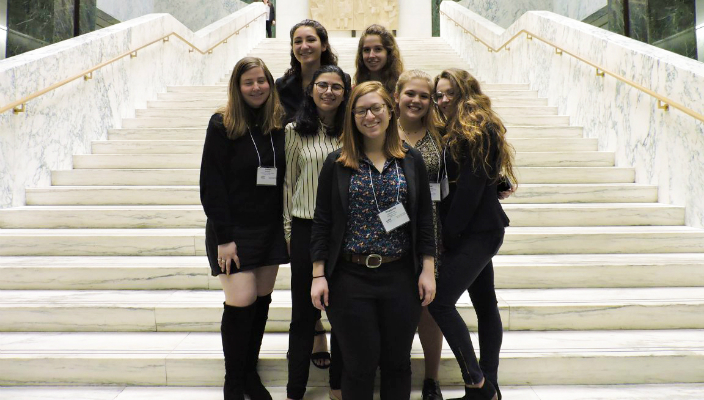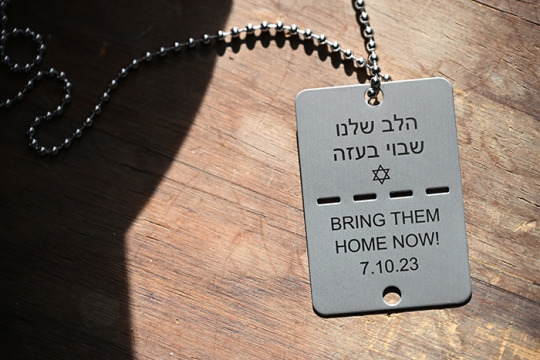
This past March, I stood in the halls of the New York State Capitol Building for NFTY New York Area Region's annual Albany Advocacy Day. Surrounded by a small group of our Kol Isha fellows, I heard one teen turn to a friend and say, “I can’t wait to sit in a conference room with all of you ten years from now and talk about all of the awesome change we’ve created.” Even in the middle of our first year of Kol Isha: Teen Feminist Fellowship, it was clear that this cohort of 12 teens had already accomplished more than the learning, peer-teaching and change-making the program was crafted to provide—they had built their own powerful community of young Jewish feminists to support each other in activism and in friendship for years to come.
When we launched Kol Isha in August 2017, our aim was to create a space where NY Area teens driven by social justice could learn from each other, increase their feminist knowledge, develop skills to communicate their beliefs to others, and create tangible change through community-oriented projects within a Jewish social justice framework.
What we learned was much bigger and speaks to the goals that many of us have as we struggle with how to engage our youth in meaningful Jewish experiences.
Our teens need to be able to speak about feminism from a place of power.
The fight for equality and justice, especially when it comes to gender equality, has been all too slow in our society—our teens know this and are eager to change it. Kol Isha was created in response to our teens’ desire to change and a core belief that young people are key to creating gender equality and significant social change.
When #MeToo stories began to come out, we took time to process together, to make sense of the layers of feelings and societal factors at play. When it came time to teach lessons and create projects, our teens had the option to explore rape culture and sexual assault, and then to work directly on the issue by writing a workshop on sexual assault awareness and consent.
Our young people—girls, boys, and gender non-conforming youth—are shaped by gender socialization and the persistent inequality that impacts all of our lives on micro- and macro-levels. When given supportive community in which they can question these social constructs and systemic inequities that shape our society and their own lives, they thrive and often become more comfortable in all of their identities.
One of our teens wrote that, “Before Kol Isha, my connection to both Judaism and feminism were just there because that's how I was raised. After hearing so many brilliant people express their ideas, I really started to question the way my friends act, the way the government acts, the way the world acts. I have learned so much about global feminism, body positivity, reproductive rights, etc. I've also learned leadership skills as well as teamwork.”
Our teens want content presented at a high level that empowers them to lead.
In planning out a one-year curriculum that would give teens both a wide and deep knowledge of feminism, it was important to include both basic building blocks of feminist thinking and a variety of topics into the plan. I decided to let our fellows do their down deep-dives into topics and to focus on setting them up with the right context and foundational pieces to bring into the rest of their work.
I found that while I had to intentionally lay out the trajectory of the curriculum—for example, they needed to understand the waves of feminism and Jewish relevance before diving into current topics—our fellows thrived when challenged with new, high-level ideas. Early on, I gave our fellows a crash course in feminist theory—a topic I didn’t learn about until college. Next, we learned about gender analysis, where they chose from articles on current events and asked inherently feminist and Jewish questions, learning to view the world through a gender lens. As we moved throughout the year and into their own presentations and projects, they learned about models of social change and how to build understanding. Our teens found success in these challenges, and—because they had been pushed—were able to lead their peers in- and outside of the program in meaningful conversations and social action.
After the program, one of our fellows said: “I’ve learned so much about how to teach and lead, but most importantly I learned about how to be confident.”
When learning is teen-driven and peer-led, teens gain immense knowledge and respect for each other.
In our peer-taught sessions, even teens who had expressed familiarity with a topic learned new facts and viewpoints to bring into their own concepts of feminism. The teens who had become experts in topics like intersectionality, for example, knew what would be of interest to their peers because they could identify gaps in their own knowledge. At the end of each session, our fellows reviewed the techniques they had witnessed and thanked each other for educating them.
Specific social justice topics can be used to teach broad social justice impact.
At the end of the year, one fellow wrote me a note reading “[Kol Isha] taught me, and the rest of us, to figure out what our activism really means for us."
Our teens crave opportunities to immerse themselves in social justice. While we chose to focus Kol Isha on gender justice, the greater hope was that we could harness the specificity feminism offers to teach broader social justice ideas—and it worked! The knowledge we taught was specifically feminist, but our teens will be able to carry their skills forward, and apply critical thinking skills and Jewish values to other justice frameworks.
Deep engagement of a small group can expand to engagement of a large circle
Through Kol Isha, we chose to invest directly in the activism and skills of our teens, with a dedicated program director and five adult mentors. In turn, our fellows invested more than 300 collective hours of their time, energy, and passion into learning, teamwork and project creation to practice tikkun olam.
So far, their Kol Isha projects—which include an awareness-raising campaign around menstrual inequality, a survey exploring gender expression, an original documentary about Tzniut (modesty), and workshops on sexual awareness & consent and body positivity—have engaged 250 individuals of multiple generations in meaningful learning, questioning and activism. With our fellows’ continued work, we anticipate that their work will reach a total of nearly 500 individuals by the end of the fall.
Kol Isha has given our fellows tools to better process and navigate the world they’re growing up in, and—more importantly—to explore and strengthen their identities within it. Teens are our leaders now, and when given the right opportunity to immerse themselves in their passions and broaden their perspectives, they use their power to create positive impact that goes far beyond themselves. For our Kol Isha fellows, this means using their Jewish values, feminist knowledge, and a strong community of their own creation as a foundation for work that is meaningful to them and has a lasting impact on their peers and their community.
A New Partnership to Expand Our Reach
We are proud to be partnering with Moving Traditions in our second year for a new iteration of the fellowship, now called Kol Koleinu (All of Our Voices). Moving Traditions brings a deep commitment to emboldening teens to challenge sexism. We are excited to bring our learnings from this past year and their commitment and expertise together to enhance the experience of a new group of fellows, in the same way that many of our participants themselves have been strengthened by the Rosh Hodesh, Shevet, and Tzelem programs that take place in congregations and Jewish Community Centers across the country. We will also expand the Fellowship this year to welcome teens from NFTY's Garden Empire Region, including Northern/Central New Jersey, Rockland County and Orange County, NY. We are excited for the impact we will make together! Learn more about the fellowship.
Imogene Winkleman is the creator of Kol Isha: Teen Feminist Fellowship—a part of her role as Regional Advisor for NFTY’s NY Area teen programming at the Union for Reform Judaism. Imogene previously worked in government relations for The Jewish Board of Family & Children’s Services, has served on National Organization of Women of New York City’s Activist Alliance, and currently serves on Planned Parenthood of NYC’s Activist Council. Imogene has additionally served as a Rosh Hodesh Group Leader and oversaw All Kind of Girls, an all-female mentoring program, in college. She holds a B.A. in Women’s & Gender Studies and Psychology from Clark University.
Have something to say about this post? Join the conversation in The Tent, the social network for congregational leaders of the Reform Movement. You can also tweet us or tell us how you feel on Facebook.
Related Posts

Summer Resources for Year-Round Board Success

URJ and Israel: Post-October 7th Updates and Resources
